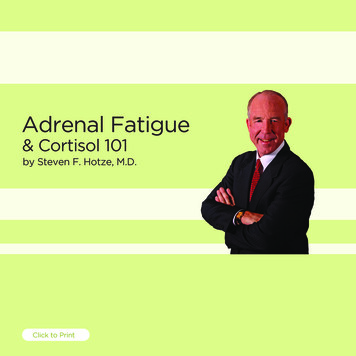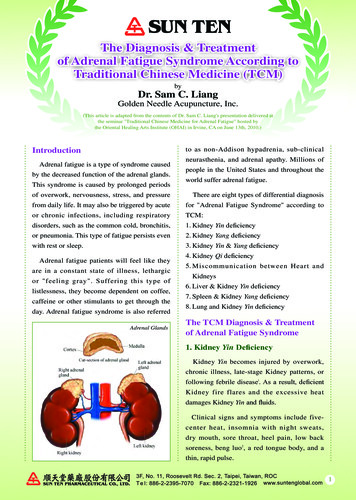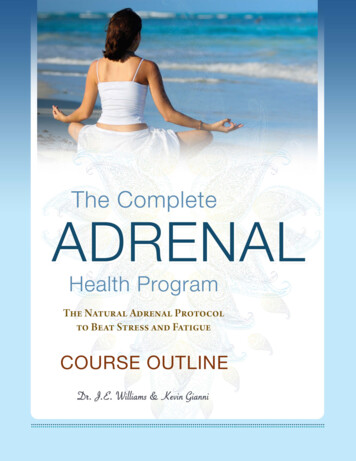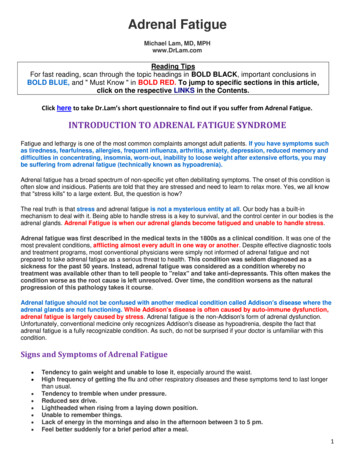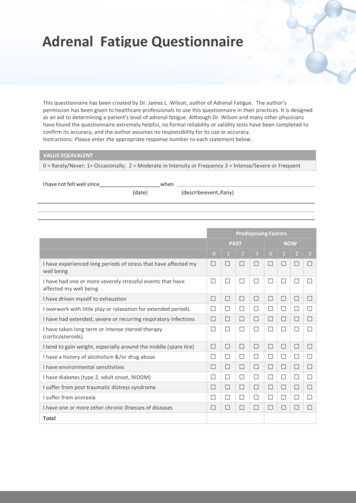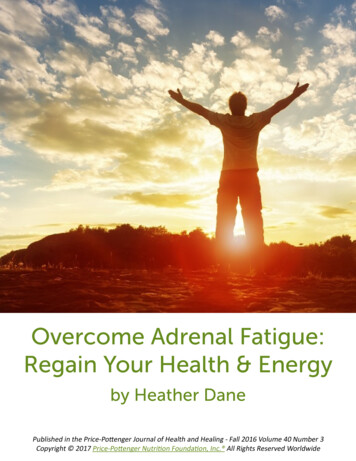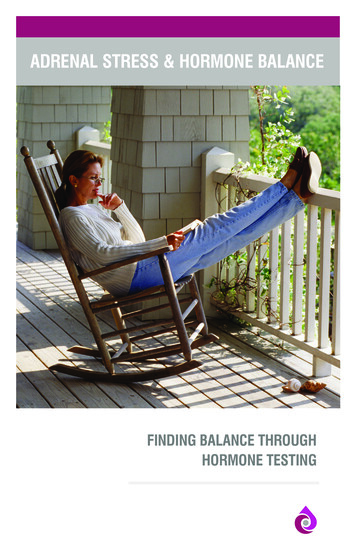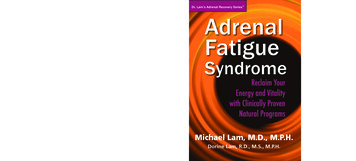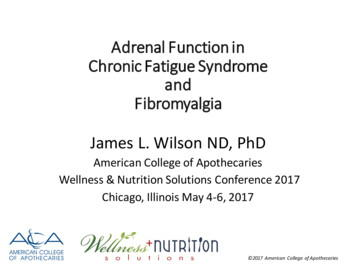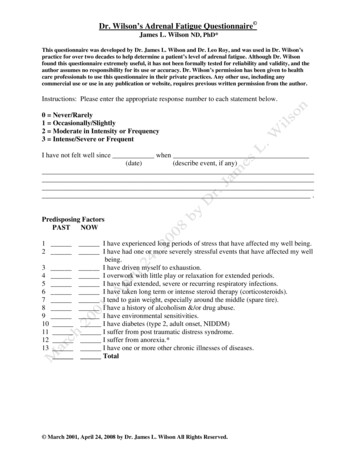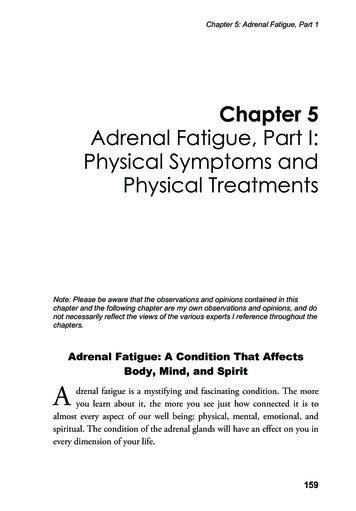
Transcription
Chapter 5: Adrenal Fatigue, Part 1Chapter 5Adrenal Fatigue, Part I:Physical Symptoms andPhysical TreatmentsNote: Please be aware that the observations and opinions contained in thischapter and the following chapter are my own observations and opinions, and donot necessarily reflect the views of the various experts I reference throughout thechapters.Adrenal Fatigue: A Condition That AffectsBody, Mind, and SpiritAdrenal fatigue is a mystifying and fascinating condition. The moreyou learn about it, the more you see just how connected it is toalmost every aspect of our well being: physical, mental, emotional, andspiritual. The condition of the adrenal glands will have an effect on you inevery dimension of your life.159
Freedom From Lyme Disease by Bryan RosnerIf you suffer from Lyme disease and related issues, it is a near certainty that you also suffer from adrenal fatigue, at least to some degree. Thesymptoms of adrenal fatigue can be very subtle, so you may not evenknow you are dealing with it. Be warned: if your symptoms are subtlenow and you don’t do something to heal your adrenal glands, your symptoms will surely progress and worsen as time goes on; the worse adrenalfatigue gets, the more difficult it is to reverse it. In fact, it becomes exponentially more dangerous the longer it is unrecognized and unresolved.The reason that adrenal fatigue is tricky to recognize is that some of themore common symptoms associated with adrenal fatigue (including emotional instability, fatigue, and other issues we will look at) are also associated with Lyme disease, making it difficult to identify which underlyingissues a person has.We will divide the topic of adrenal fatigue into two parts: the physicalmanifestations, and the non-physical manifestations. The current chapterwill address the physical manifestations, and the following chapter (Chapter 6) will address the non-physical manifestations (which include mental,emotional, and spiritual aspects). The two chapters are inseparably connected and are intended to be an overview of the topic of adrenal fatigue.For more extensive, in-depth coverage, I will provide book and websiterecommendations at the end of this chapter, and I implore you to look atthese additional resources. Adrenal fatigue is a very counter-intuitive,dangerous condition, and if you suffer from it, you really need to do someextensive reading on the topic if you hope to get well.IntroductionThe adrenal glands are endocrine glands that rest on top of the kidneys. When functioning properly, they produce many types of hormones,including stress hormones. These glands are critical to proper body functioning on numerous levels. Many problems, including thyroid imbalances, depression, chronic fatigue syndrome, panic disorders and agitation,160
Chapter 5: Adrenal Fatigue, Part 1mood imbalances, and a plethora of emotional symptoms may be due toadrenal fatigue.Adrenal fatigue occurs when the adrenal glands cannot keep up withthe quantity of hormones they are required to produce to maintain bodilyfunctions. When this happens, the adrenals become drained, and the bodyexperiences a growing net deficit of essential hormones. The result is thatthe body is no longer able to expend energy on physical, mental, andemotional activities. Since everything we do as humans is either physical,mental, or emotional (or a combination of the three), adrenal fatigue hasan impact on each and every aspect of our lives. While there are manyother features of adrenal fatigue, as we will see, the primary point to remember is that adrenal fatigue is a problem of energy inadequacy. Whenyou have adrenal fatigue, you will get worse when you expend too muchphysical, mental, or emotional energy, and you will get better when youallow for sufficient physical, emotional, and mental rest.Adrenal fatigue is a problem that leads to massive dysfunctionthroughout almost all body systems. In this way, adrenal fatigue is veryunlike other kinds of health problems. For example, if you have chestcongestion, you are likely to only experience a narrow set of symptomslimited to the lungs. Not so with adrenal fatigue. If you have adrenalfatigue, you’ll experience dysfunction in nearly every other organ in thebody, and you’ll experience dozens of seemingly unrelated, yet severe,symptoms. Because of this, adrenal fatigue is a serious problem. Peoplewith severe adrenal fatigue are often confined to their beds for years at atime without enough energy to even walk down the stairs and eat breakfast. A long-time family friend is such a person, and I’ve watched hermaintain this state for over two decades. It has been very sad to see.Adrenal fatigue is typically caused by one or more of the followingcircumstances:161
Freedom From Lyme Disease by Bryan Rosner1. Disease—The adrenal glands are weakened and compromised byphysical disease and are not able to operate at full capacity. In thiscase, the adrenals themselves are physically damaged by somedisease process.2. Stress—A person experiences extreme stress, worry, emotionaldistress, anxiety, or other feelings which trigger the fight or flightresponse for an extended period of time. In this case, the adrenalsmay not have been physically damaged by a disease, but they canstill become depleted, drained and exhausted, if mental oremotional stress is prolonged or severe.3. Brain Dysfunction—In circumstances when a person’s stress levelis normal and not excessive, the adrenal glands may still becomefatigued if the brain is malfunctioning and sending overstimulatory signals to the adrenal glands, telling them to produceexcessive stress hormones. This situation typically results fromsome kind of dysfunction within the brain, not the adrenal glands.There are other causes of adrenal fatigue, including dietary issues andother physical/emotional problems. However, the above three will be theones we focus on. For Lyme disease sufferers, all three are typically in play.Lyme disease and co-infections (especially Bartonella) cause physical damage to the adrenal glands themselves, leading to #1 occurring. #3 happenswhen Lyme disease and co-infections cause physical damage to the brain,which disrupts signals sent from the brain to the adrenal glands, causingthe adrenal glands to get false alarms and overreact to even the smalleststress stimulus. And #2 happens during the course of normal life eventsand stresses, but is exacerbated by #’s 1 and 3. While healthy people aresusceptible to adrenal fatigue, they are typically only vulnerable to #2, andtherefore, they can tolerate significantly more stress than can Lyme diseasepatients before their adrenals begin to fail. This discussion should illustrate that Lyme sufferers are much more susceptible to adrenal fatiguethan the general population.162
Chapter 5: Adrenal Fatigue, Part 1One last note before we move on: Adrenal fatigue is an issue thatcompounds as the adrenals become more exhausted. Exhausted adrenalglands become much more sensitive to stress. So, the experience of adrenalfatigue can be a downward spiral. When the adrenals are in bad shape,relaxation and de-stressing is desperately needed, yet finding relaxationand peace are much more difficult because the adrenals over-react to eventhe smallest stressful stimulus. This puts people with adrenal fatigue in avery precarious and dangerous position; a paradox of sorts. Moderate tosevere adrenal fatigue is a very serious and life-threatening health problemwhich needs to be treated with the utmost caution and respect.Symptoms of Adrenal FatigueThe symptoms of adrenal fatigue can overlap tightly with the symptoms of Lyme disease. In many instances, this leads to poor recognition ofadrenal fatigue as people mistakenly attribute all of their symptoms toLyme disease. Some common symptoms of adrenal fatigue include exercise intolerance, sleep disturbances, lack of energy and fatigue, and feelingoverwhelmed by the smallest of tasks. It is common to feel exhausted yetnot be able to sleep. Since these are all potentially Lyme disease symptoms, too, it can be tricky to know what’s really going on. One way todistinguish adrenal fatigue from the plethora of Lyme disease symptoms isto look for emotional instability, fatigue, sleep disturbances, and othersymptoms which have their onset the day after exercise.Also, while Lyme disease can cause fatigue and weakness, the fatigueand weakness that accompany adrenal fatigue are often much worse andmuch more debilitating. Lyme disease sufferers without adrenal fatiguemay feel horrible hiking up several flights of stairs, but they can still do it.In contrast, those with severe adrenal fatigue may not be able to make itup the stairs at all, or if they do make it, they will experience a huge crashin the following days.163
Freedom From Lyme Disease by Bryan RosnerAnother possible differentiating feature is that adrenal fatigue typically begins or worsens after a person experiences extremely stressful lifeevents; for example, divorce, the death of a loved one, loss of a job, orother similar challenges. Numerous tests are available to measure thehormones produced by the adrenal glands to determine whether they areat normal levels. I am not convinced that these tests are significantly useful, but in the hands of the right doctor they may provide clues.Shortness of breath, or rapid breathing, may also be present when theadrenals are exhausted, and there are several deep breathing techniquesavailable to help reset the breathing patterns to normal. Of course,Babesia also causes shortness of breath, adding to the confusion. However,the shortness of breath that comes with adrenal fatigue is often accompanied by other adrenal fatigue symptoms, while the shortness of breath thatcomes with Babesia is often accompanied by other Babesia symptoms;therefore, you will have clues to help you determine what the root causeof your symptoms is.The startle response can also be heightened when adrenal fatigue ispresent. The body may feel like it is always on high alert. Again, unfortunately, this symptom can also be caused by tick-borne infections whenadrenal fatigue is not present, hence, the difficulty of determining whichproblems are caused by adrenal fatigue and which are caused by tickborne infections.For men, adrenal fatigue symptoms can be brought on or exacerbatedby sex because the demand to create new hormones during and after sexdrains the adrenal glands.Adrenal fatigue symptoms are often experienced as “crashes.” Thesecrashes can include the sudden onset or worsening of symptoms. Theinitial crashes are often the worst, because they typically precede awarenessof the problem, and are, hence, not addressed with the proper therapiesand interventions. If the proper steps are taken and recovery begins, these164
Chapter 5: Adrenal Fatigue, Part 1crashes will be experienced with less frequency and severity over time,leading to a slow, uphill climb out of the depths of adrenal fatigue. However, if exercise or other taxing activities are resumed too soon during therecovery process, or if worry and stress overwhelm the adrenal glands,then backsliding can occur in the form of additional serious crashes. Adrenal fatigue experts, such as Dr. Lam, whose book is referenced at theend of this chapter, often use a graph to illustrate the “crash-recovery”cycle and the various phases of healing. Unfortunately, recovering from asevere adrenal crash can be a very prolonged process, often requiring sixmonths to three years. The good news, as we will see in the followingchapter, is that the lifestyle changes required to heal from adrenal fatigueare often very positive, healthy changes that can lead to a more satisfyingand relaxed life.Emotional SymptomsWe will address the emotional aspects of adrenal fatigue in the nextchapter, but it is important to be introduced to these symptoms before wego any further.The most debilitating symptoms of adrenal fatigue are the emotionalsymptoms. These symptoms aren’t “all in your head.” Weakened adrenalsactually cause physical imbalances in the body and are the underlyingphysical cause for feelings of guilt, shame, insecurity, desperation, sadness,anger, and others. Remember, the brain is a physical organ, and how youfeel is influenced by the chemical reactions taking place in your brain.Adrenal fatigue causes physical changes in many parts of the body, andthese physical changes lead to brain imbalances that result in tremendouschanges in how a person feels about him or herself, and how they feelabout the rest of the world. It can be very easy to just write these symptoms off as normal emotional responses to being in a tough situationinvolving chronic illness or life trauma. However, research concludes theopposite: these symptoms are not a natural and normal response to being165
Freedom From Lyme Disease by Bryan Rosnersick. Instead, they are physical in nature and a direct result of the damagethat the infections are doing to your organs.It is important to realize that the symptoms we are talking about hereare the result of real, physical causes. This opens the door to treating themwith real, physical treatments rather than limiting the treatment approachto therapies like counseling or meditation. While psychological approaches are helpful, and are indeed needed for adrenal fatigue recovery (as we’llsee), they will never completely solve the problem as long as the problemincludes unresolved physical dysfunction within the brain, organs, andadrenal glands.The above paragraphs are not a complete list of the symptoms of adrenal fatigue; numerous other symptoms exist. At the end of this chapter,I will provide resources for other books and websites which can shed additional light on the symptoms of adrenal fatigue.As I am fond of recommending, a therapeutic trial of treatment foradrenal fatigue may be helpful when you don’t know whether or not youhave the condition. If you respond positively to the therapeutic trial, itmay help confirm the existence of adrenal fatigue. If you experience noresponse, then it may indicate that you are not suffering from adrenalfatigue. However, keep in mind that almost all victims of tick-borne infections have adrenal fatigue to some degree.Treating Adrenal FatigueThe treatment of adrenal fatigue is perhaps one of the most frustrating endeavors you will encounter during your recovery from Lyme diseasebut also one of the most potentially rewarding. As Americans, we are usedto taking a pill to make our health problems disappear. In fact, not onlydo we want to take a pill, we want to be back on our feet as quickly aspossible to participate in the busy lives that we lead. Even Lyme diseasesufferers have this expectation: “Doctor, just give me my antibiotic pre166
Chapter 5: Adrenal Fatigue, Part 1scription right away, and give me the highest dose possible!” And, in fact,Lyme sufferers do get better with aggressive treatment. Maybe antibiotictherapy alone isn’t enough, but certainly other kinds of aggressive treatments can be helpful.Adrenal fatigue turns this treatment paradigm on its head. When itcomes to adrenal fatigue, we need to literally re-wire our thought processes and expectations for recovery.In the beginning of this chapter, we talked about how the adrenalglands in people with Lyme disease are weakened by infections and areover-stimulated by haywire signals from a malfunctioning brain. Thisleaves those who suffer from Lyme disease destabilized and compromised,and even less capable of dealing with the stresses of normal life. There isno pill or supplement which can fix this problem. The only way to healthe adrenal glands is to give them a rest and remove the stressors whichare keeping them down.So, removing the infections which weaken the adrenal glands, as wellas healing the brain so that it doesn’t send haywire signals to them, isimportant. However, eliminating life stress is also critical and is not easilydone. In fact, it may require a complete re-working of your lifestyle, priorities, vocation, and even relationships. This is hundreds of times moredifficult than popping a few pills. When we talk about removing lifestress, we aren’t just talking about avoiding fights with your spouse orboss. We are talking about re-thinking your entire outlook on life, andmaking peace with the many internal and external factors that add anxietyand worry to your life. To heal from adrenal fatigue, you almost have tofigure out how to become a whole new person. The treatment for adrenalfatigue isn’t an easy pursuit, and unfortunately, some people are unwillingor unable to make the necessary changes.The next chapter will address these kinds of lifestyle changes in moredetail. The simple reality is that to heal from adrenal fatigue, we have to167
Freedom From Lyme Disease by Bryan Rosnerliterally change what we do on a day-to-day basis and how we think aboutour lives. These changes, while difficult, can ultimately be very rewarding,as we attempt to live a more balanced and relaxed life.There are, of course, various supplements, prescriptions, and therapies which claim to help with adrenal fatigue. For some people, such interventions may be useful, but for most Lyme disease sufferers, they willdo nothing more than artificially stimulate the adrenal glands which willlead to greater adrenal weakness at some point in the future. Or, in thecase of interventions which provide the body with external hormones, theadrenal glands will atrophy and shut down, causing a dependence on theinterventions and a permanent weakening of the adrenal glands. In bothcases, the end result is not healing and rehabilitation but further debilitation and damage. Again, the only true, lasting recovery comes from removing the physical and emotional stresses from the adrenal glands,which allows them to heal and rebuild. I can tell you from experience thatmany Lyme sufferers (including myself) are reluctant to accept this realityand will first run through the gamut of quick fix treatments before theycome to terms with the truth about adrenal fatigue.While supplements and nutrients cannot be a substitute for rest andthe elimination of stressors, they can provide support during the recoveryprocess. Let’s examine some of the available supplements and treatments,and discuss their pros and cons. Let’s start by looking at vitamins andfood choices, because they stand apart from other supplement options intheir ability to actually provide true, long-term healing.B Vitamins, Vitamin C, and Food ChoicesWhile most available supplements and interventions are merebandaids, the vitamins and food choices we will look at here are amongthe few interventions which actually lead to healing and rebuilding, notjust temporary progress or masking of symptoms. Why are these particularinterventions helpful? Because even when lifestyle modifications are cor168
Chapter 5: Adrenal Fatigue, Part 1rectly implemented and stressors are removed, the adrenal glands muststill be given the raw materials to heal and rebuild. These raw materials arefound in the foods and vitamins discussed now. Without these specialfoods and vitamins, recovery can take a lot longer.Vitamin C. Scientists have noticed that vitamin C is found in highconcentrations in the adrenal glands. In fact, there is no other part of thebody which hoards vitamin C like the adrenal glands. Vitamin C is criticalfor proper adrenal function and during adrenal exhaustion, vitamin Creserves are quickly used up. As a result, vitamin C supplementation—specifically, liphophilic vitamin C, also known as “Lipo C,” which is highly absorbable and bioavailable to the adrenal glands (and other body systems)—is extremely important during recovery from adrenal fatigue.Various companies manufacture Lipo C, including Researched Nutritionals and LivOn Labs. Lipo C will be discussed in more detail in Chapter17. Note: vitamin C increases the absorption of iron, so if you have unhealthy high iron levels, be careful not to take vitamin C near the time ofconsumption of high-iron meals.B Vitamins. All of the B vitamins, but especially vitamin B5 (pantothenic acid, or pantethine in the more active form) are essential for adrenal function and are quickly drained during adrenal fatigue. Consequently,supplementation with a B complex as well as higher doses of pantothenicacid and/or pantethine is necessary during recovery from adrenal fatigue.My favorite B complex, “B Right,” is made by Jarrow Formulas and isavailable from Amazon.com and iHerb.com. Note that toward the end ofadrenal fatigue recovery, doses of these vitamins may have to be decreasedas the adrenal glands learn to function on their own. Excessive doses canoverwhelm the adrenal glands.Multivitamin and Multimineral. While not as important as vitamin C and the B vitamins, a multivitamin and multimineral are still important during recovery from adrenal fatigue. The adrenal glands usemany vitamins and minerals as cofactors during proper functioning.169
Freedom From Lyme Disease by Bryan RosnerFood Choices. Dietary habits are very important during recovery fromadrenal fatigue. The chapter of this book on diet (Chapter 4) includes notjust healthy foods, but healthy foods which are specifically compatiblewith adrenal fatigue recovery. Cholesterol and saturated fat are very important for adrenal hormone production and should be consumed regularly. Chicken broth, especially homemade from an organic chicken, isparticularly healing to the adrenal glands. Animal sources of protein andfat should be chosen over vegetarian sources. Frequent, smaller mealsthroughout the day provide support during the early stages of adrenalfatigue recovery: these meals should include animal protein. When badlybeat up, the adrenal glands will need simple carbohydrates eaten in smallportions throughout the day to help provide basic energy. High salt foodsare also important in the initial phases of healing. Amino acid supplements such as pea protein, whey protein, and similar products can helpthe adrenals to rebuild. For more on a diet that promotes adrenal healing,see Chapter 4.The above food choices and vitamin/mineral supplements are criticalto the healing process and are more important than any other supplements or herbs. They provide the adrenal glands the basic building blocksnecessary to rebuild and recover. Now, let’s move on to examine otheradrenal fatigue therapies which have less value in the healing process.Adaptogenic HerbsAdaptogenic herbs such as Maca, Ashwagandha, and Rhodiola aresaid to help the body to better cope with stress. They may also have adirect effect on the adrenal glands by stimulating them or attempting toregulate them. While these herbs can be helpful for people with very mildadrenal fatigue, or when used for very short periods in people with moreadvanced adrenal fatigue, they still do not address the underlying causes ofadrenal fatigue and life stress. Therefore, despite what some marketersmay say, they hold only a small place in the treatment of advanced adrenal170
Chapter 5: Adrenal Fatigue, Part 1fatigue. Overusing them may, in fact, over-stimulate the adrenal glandsleading to even further problems and adrenal weakness.Hormone Supplementation and GlandularsAdrenal fatigue results in inadequate production of adrenal hormonessuch as cortisol. As a result, some patients and practitioners choose tosupplement with cortisol, cortisol precursors such as pregnenolone, ornatural substances (like licorice) which may act like cortisol in the body.All of these interventions can lead to feeling better quickly. The problem is that they may turn off the adrenal glands and cause adrenal glandatrophy. As the body gets used to receiving hormones from an externalsource, it turns off endogenous production. This can have dire long-termconsequences as the adrenal glands may never recover their original functionality and activity. While some doctors advocate very small doses ofcortisol, even these have been correlated with future problems. Proceedwith extreme caution when it comes to any kind of treatment which introduces hormones into the body from an external source. These treatments may be useful as temporary rescue interventions but should only beused during the initial phase of recovery, while you are busy getting yourlifestyle straightened out and removing other stressors from the adrenalglands. Make sure you are under the care of an experienced physician ifyou use any of these interventions.Licorice is one herb that is used because it may cause the cortisol secreted by the adrenal glands to remain in the bloodstream for longer periods of time before being eliminated from the body. While licorice isprobably a less dangerous intervention than hormone supplementation, itshould still be used with caution.Glandular supplements are simply supplements made out of theglands of other animals such as cows. Adrenal glandulars are available for171
Freedom From Lyme Disease by Bryan Rosnersale under many brands and are typically made from dessicated (dried)cow adrenal glands. The philosophy behind consuming glandulars is thatyou aren’t just getting one hormone, like you would with, say, cortisolsupplementation. Instead, you are ingesting the entire adrenal gland of theanimal, which contains dozens of hormones, tissues, and nutrients, all inthe correct proportions and quantities. Glandulars are also available forother organ systems, such as the brain, liver, thymus, and others. Manyhealers believe that you can heal the liver by consuming liver glandular,and you can heal the brain by consuming brain glandular, and so forth.While adrenal glandulars may cause the same problems as other kindsof hormone supplementation, namely, the inactivation and atrophy of theadrenal glands, in my opinion, glandulars are more gentle, beneficial, andhealing than direct hormone supplementation. Using glandulars in moderation may provide the adrenal glands with a temporary rest and allowthem to rebuild. This makes glandulars my favorite adrenal fatigue supplement, but they come with the warning that they are not capable ofproviding complete healing. They are only capable of providing a temporary rest. Complete healing, again, can only come from removing theunderlying stressors burdening the adrenal glands. For a therapeutic trialto test whether one may be suffering from adrenal fatigue, glandulars maybe a good choice. Lastly, even glandulars may lead to adrenal atrophy, sothey should be used only temporarily. Only use them when you are readyto make all the other lifestyle changes described in the following chapter.If you use glandulars and are unwilling to provide other kinds of supportfor the adrenal glands, you will be wasting their effectiveness on a temporary boost, and you’ll be left right back at square one when you discontinue taking them.Wisdom governing the use of adrenal supplements can be summarized as follows: Always prefer rest, a low-stress lifestyle, and nutritionwhen healing from adrenal fatigue. Every other intervention is a crutchwhich might be beneficial for a short period, but which will only be abandaid covering symptoms.172
Chapter 5: Adrenal Fatigue, Part 1Tips for Recovery, with a Focus on LymeDiseaseLet’s now take a look at some general, guiding principles for recoveryfrom adrenal fatigue, with a specific focus on the unique challenges presented by Lyme disease.Symptom SupportWhen the adrenals are not working properly, many body systems getthrown off. You may require sleep aid, thyroid support, digestive support,and other interventions while you are healing your adrenals. The booksand websites listed at the end of this chapter provide details on this type ofsupport. Remember, though, this support is a bandaid intended to helpyou get started on the real treatment; that is, long-term, comprehensive,stress reduction, and removal of the infections causing tissue damagewithin the adrenal glands.Getting Better and Getting WorseDo not take the task of recovering from adrenal fatigue lightly. If youhave some degree of adrenal fatigue now and do not do something aboutit, it will continue to get worse and may debilitate you. The further thecondition progresses, the more difficult it is to reverse.To understand adrenal fatigue recovery, consider this over-archingprinciple: When the stressors placed on the adrenal glands are less thanthe capacity of the adrenal glands, recovery progresses. When the stressorsare greater than the capacity of the adrenal glands, recovery regresses. Sorecovery requires extended periods during which rest exceeds stress. Exactly how much stress you can tolerate without backsliding depends on howmessed up your adrenal glands are. This logic leads us to the conclusionthat the longer you wait before you begin healing your adrenals, the less173
Freedom From Lyme Disease by Bryan Rosnerstress you’ll be able to tolerate during the recovery process without backsliding. If you think about it, this can become a very serious, precarioussituation. The sicker you become, the harder it will be to get better.Those with severe adrenal fatigue can get thrown into a tailspin afterseemingly inconsequential exercise, like walking up a flight of stairs. Thesepeople require extreme lifestyle modification and near complete rest, ifthey are to recover. On the other hand, people with minor adrenal fatiguecan jog a mile and only experience mild adrenal symptoms. But one thingholds true: mild adrenal fatigue will progress to serious adrenal fatigue ifstress exceeds rest.Worthy of note, particularly with Lyme disease, is the need to eliminate the infections in order for recovery to take place. Because the adrenals are weakened by Lyme disease and co-infections, treating theseinfections is a primary component to getting well. In addition, it is important to control lifestyle stress, take in the correct nutrients, and maintain an adrenal-friendly
adrenal fatigue as people mistakenly attribute all of their symptoms to Lyme disease. Some common symptoms of adrenal fatigue include exer-cise intolerance, sleep disturbances, lack of energy and fatigue, and feeling . renal fatigue experts, such as Dr. Lam, whose book is referenced at the end of this chapter, often use a graph to illustrate .
